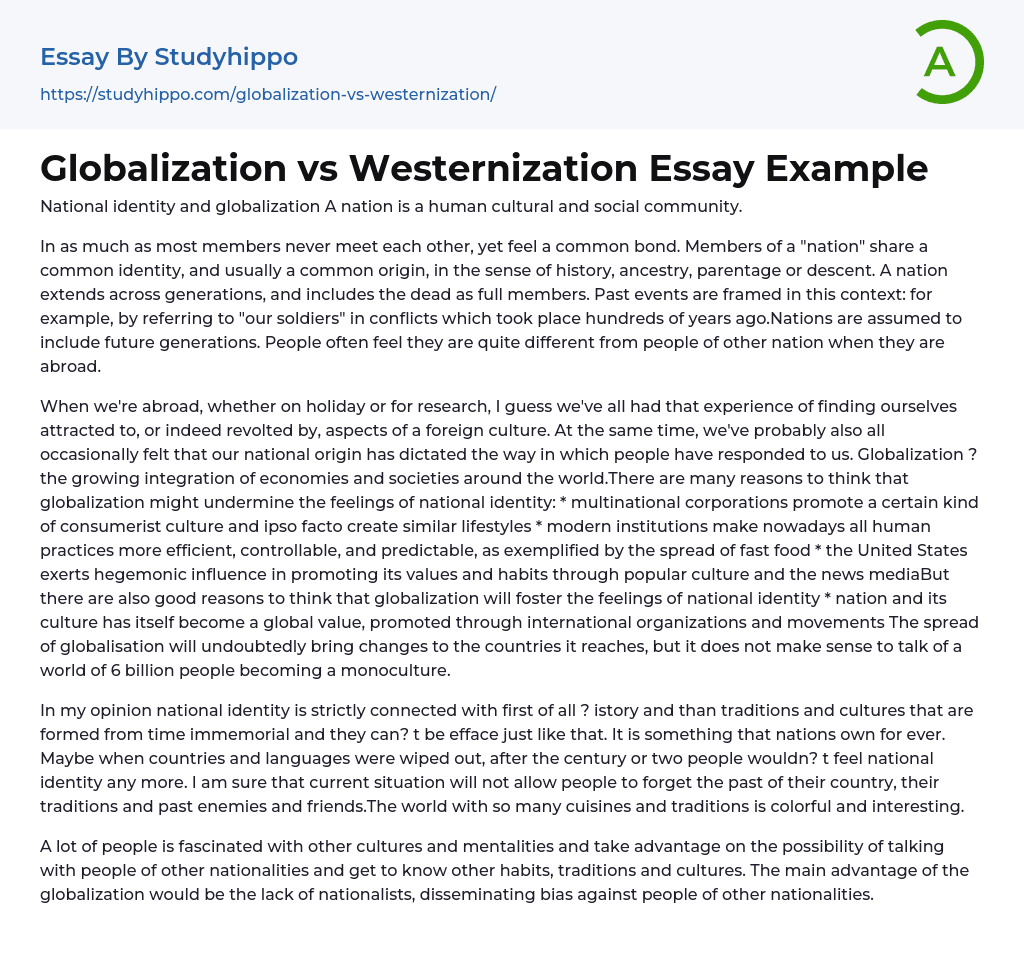National identity and globalization A nation is a human cultural and social community.
In as much as most members never meet each other, yet feel a common bond. Members of a "nation" share a common identity, and usually a common origin, in the sense of history, ancestry, parentage or descent. A nation extends across generations, and includes the dead as full members. Past events are framed in this context: for example, by referring to "our soldiers" in conflicts which took place hundreds of years ago.Nations are assumed to include future generations. People often feel they are quite different from people of other nation when they are abroad.
When we're abroad, whether on holiday or for research, I guess we've all had that experience of finding ourselves attracted to, or indeed revolted by, aspects of a foreign culture. At the same time, we've probabl
...y also all occasionally felt that our national origin has dictated the way in which people have responded to us. Globalization ? the growing integration of economies and societies around the world.There are many reasons to think that globalization might undermine the feelings of national identity: * multinational corporations promote a certain kind of consumerist culture and ipso facto create similar lifestyles * modern institutions make nowadays all human practices more efficient, controllable, and predictable, as exemplified by the spread of fast food * the United States exerts hegemonic influence in promoting its values and habits through popular culture and the news mediaBut there are also good reasons to think that globalization will foster the feelings of national identity * nation and its culture has itself become a global value, promoted through international
organizations and movements The spread of globalisation will undoubtedly bring changes to the countries it reaches, but it does not make sense to talk of a world of 6 billion people becoming a monoculture.
In my opinion national identity is strictly connected with first of all ? istory and than traditions and cultures that are formed from time immemorial and they can? t be efface just like that. It is something that nations own for ever. Maybe when countries and languages were wiped out, after the century or two people wouldn? t feel national identity any more. I am sure that current situation will not allow people to forget the past of their country, their traditions and past enemies and friends.The world with so many cuisines and traditions is colorful and interesting.
A lot of people is fascinated with other cultures and mentalities and take advantage on the possibility of talking with people of other nationalities and get to know other habits, traditions and cultures. The main advantage of the globalization would be the lack of nationalists, disseminating bias against people of other nationalities.
- Anthropology essays
- Audience essays
- Charity essays
- Cultural Competence essays
- Emile Durkheim essays
- Gender Roles essays
- Generation essays
- Globalization essays
- Interpersonal Relationship essays
- People essays
- Race essays
- Social Change essays
- Social Class essays
- Social Movement essays
- Social Science essays
- Social Status essays
- Social Stratification essays
- Society essays
- Sociological Imagination essays
- Sociological Perspective essays
- Sociological Theories essays
- Stereotypes essays
- Web Dubois essays
- Activism essays
- Communism essays
- Conservatism essays
- Liberalism essays
- Marxism essays
- Nationalism essays
- Patriotism essays
- Policy essays
- Public Policy essays
- Social Contract essays
- Socialism essays
- Totalitarianism essays
- Abnormal Psychology essays
- Abraham Maslow essays
- Attachment Theory essays
- Authority essays
- Behaviorism essays
- Classical Conditioning essays
- Cognitive Psychology essays
- Counseling essays
- Developmental Psychology essays
- Educational Psychology essays
- Erik Erikson essays
- Family Therapy essays
- Jean Piaget essays
- Maslow's Hierarchy Of Needs essays
- Mental Health essays




